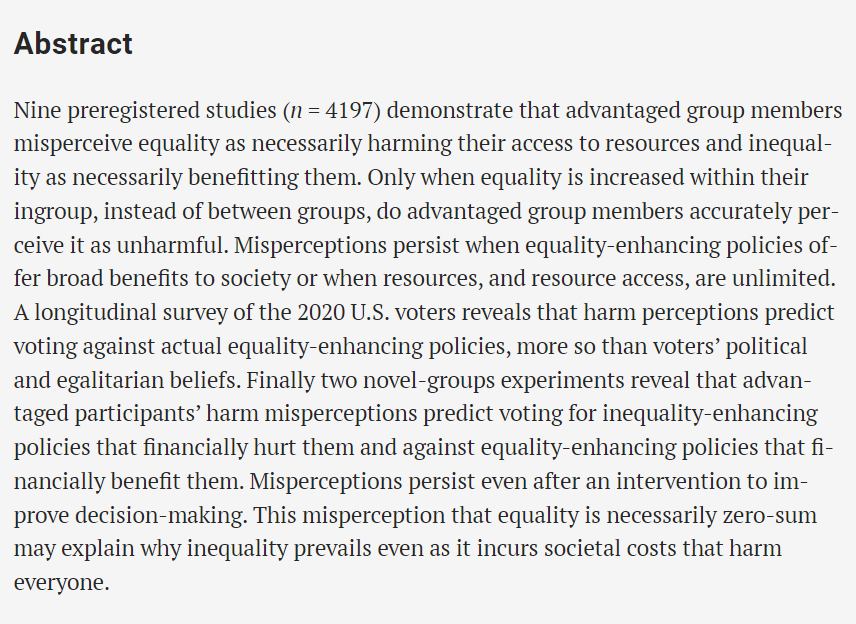General Discussion
Related: Editorials & Other Articles, Issue Forums, Alliance Forums, Region ForumsIf you rise, I fall: Equality is prevented by the misperception that it harms advantaged groups


https://www.science.org/doi/10.1126/sciadv.abm2385
https://www.science.org/doi/pdf/10.1126/sciadv.abm2385 (PDF)

Distributed under a Creative Commons Attribution License 4.0 (CC BY).

INTRODUCTION
Members of societally advantaged groups frequently support the concept of equality (1, 2) and yet use their advantaged position to implement policies that perpetuate inequality (3). This tendency persists even as inequality threatens the prosperity of disadvantaged and advantaged groups alike. Racial inequality costs the U.S. economy an estimated $16 trillion in lost gross domestic product (GDP) (4), failing to hire job seekers with a criminal history results in an annual loss of $78 billion in U.S. GDP (5), and the persistent gender pay gap restrains the global economy by about $160 trillion (6). These overall economic costs harm advantaged group members as well (7). Why then do the members of society who hold the greatest power to create change instead allow inequalities to continue, or worsen, even as they exact a toll on everyone? We argue that it is because advantaged group members misperceive that equality necessarily comes at a cost to their group.
Decades of research make it clear that people closely attend to how well-off they are compared to others and behave in ways that maximize their relative advantages (8, 9). As a result, people often perceive situations to be zero-sum, even in situations that are not (10–12). For instance, the “fixed pie bias” leads negotiators to see their interests as unavoidably opposed to those of their counterpart, even when there exist opportunities to improve the well-being of one or both parties without harming either (13–15). People even construe everyday transactions—such as buying food or purchasing a car—as resulting in a winner and a loser (16). These beliefs can cause policy-makers and voters to perceive that new policies will negatively affect them more than they will benefit others, even when the opposite is true (17). The result is that societies often continue to suffer under suboptimal public policies (18).
We posit that this same focus on relative advantages leads people to misperceive the effects of equality. Researchers have long known that people prefer an unequal distribution of resources, such that greater amounts of resources are allocated to ingroup members than to outgroup members (19–21). This preference often persists even when a more equal distribution of resources would benefit one’s ingroup. For instance, people will choose to receive fewer resources if that choice secures their group’s relative advantage over an outgroup (i.e., Vladimir’s choice) (22). Building upon this research, we propose a new explanation for this phenomenon—that people fundamentally misperceive losses of relative advantage as losses in absolute terms. We hypothesize that advantaged group members perceive policies that reduce disparities between groups as reducing resource access for the advantaged group, even when this is not the case. We conversely predict that advantaged group members perceive policies that worsen or maintain disparities between groups as increasing resource access for the advantaged group, even when this is not so. As a result, advantaged groups are likely to oppose non–zero-sum increases in resource equality on the basis of mistaken assumptions that they are protecting their access to these resources.
snip
The Magistrate
(95,247 posts)Last edited Tue Jun 7, 2022, 03:38 AM - Edit history (1)
The perception of superiority is a real benefit of advantage, whether economic or social. Equality does reduce this psychic benefit. Since most people who feel themselves advantaged by compare to the rest are in fact, in both economic and social status, far below the top rungs of the social ladder, this psychic benefit is important to them, and raising the status of those they are accustomed to looking down on causes them distress accordingly.
2naSalit
(86,590 posts)That is what they fear, losing their sense of superiority. It's what makes life worth living in our current social construct. If we could change that, we might have a chance at some point.
And heaven forbid they should experience anything other than euphoria.
IngridsLittleAngel
(1,962 posts)'nuff said.